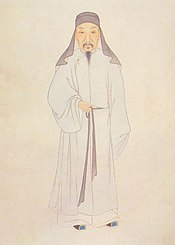Gu Yanwu
| Gu Yanwu | |||||||||||||||||||||
|---|---|---|---|---|---|---|---|---|---|---|---|---|---|---|---|---|---|---|---|---|---|
 |
|||||||||||||||||||||
| Born |
Gu Jiang 顧绛 15 July 1613 |
||||||||||||||||||||
| Died | 15 February 1682 (aged 68) | ||||||||||||||||||||
| Other names | Gu Zhongqing 顧忠清 Gu Ningren 顧寧人 Lord Tinglin 亭林先生 |
||||||||||||||||||||
| Occupation | Student of the Guozijian (1643) | ||||||||||||||||||||
| Known for | One of the Five Great Qing scholars (Huang Zongxi, Fang Yizhi, Wang Fuzhi, Zhu Zhiyu) | ||||||||||||||||||||
| Spouse(s) | Lady Zhu | ||||||||||||||||||||
| Parent(s) | Gu Tongying (father) Lady He (mother) |
||||||||||||||||||||
| Relatives | Great grandfather: Nephew: , , |
||||||||||||||||||||
| Chinese name | |||||||||||||||||||||
| Traditional Chinese | 顧炎武 | ||||||||||||||||||||
| Simplified Chinese | 顾炎武 | ||||||||||||||||||||
|
|||||||||||||||||||||
| Transcriptions | |
|---|---|
| Standard Mandarin | |
| Hanyu Pinyin | Gù Yánwǔ |
| Wade–Giles | Ku4 Yen2-wu3 |
| IPA | [kû i̯ɛ̌n.ù] |
| Yue: Cantonese | |
| Yale Romanization | Gu Yìhm-móuh |
| Jyutping | Gu3 Jim4-mou5 |
| Southern Min | |
| Tâi-lô | Kòo Iām-bú |
Gu Yanwu (Chinese: 顧炎武) (July 15, 1613 – February 15, 1682), also known as Gu Tinglin (Chinese: 顧亭林), was a Chinese philologist and geographer. He spent his youth during the Manchu conquest of China in anti-Manchu activities after the Ming Dynasty had been overthrown. He never served the Qing Dynasty. Instead, he traveled throughout the country and devoted himself to studies.
Gu, a native of Jiangsu, was born as Gu Jiang (simplified Chinese: 顾绛; traditional Chinese: 顧絳; pinyin: Gù Jiàng). Gu began his schooling at the age of 14. In the spring of 1645, Gu was recommended to be the position of Bingbu Siwu in the royal court at Nanjing. There he proposed many ideas. Unsatisfied with the royal court's organisation, Gu resigned and returned to his hometown. In 1655, local officials laid charges against him and threw him into prison. He was released from prison with the help of a friend.
Inspired by Chen Di, who had demonstrated that the Old Chinese has its own phonological system, Gu divided the words of Old Chinese into 10 rhyme groups, the first one to do so. His positivist approach to a variety of disciplines, and his criticism of Neo-Confucianism had a huge influence on later scholars. His works include Yinxue Wushu (音學五書), Ri Zhi Lu (日知錄) and Zhao Yu Zhi (肇域志).
Along with Wang Fuzhi and Huang Zongxi, Gu was named as one of the most outstanding Confucian scholars of the late Ming and early Qing Dynasty.
...
Wikipedia
